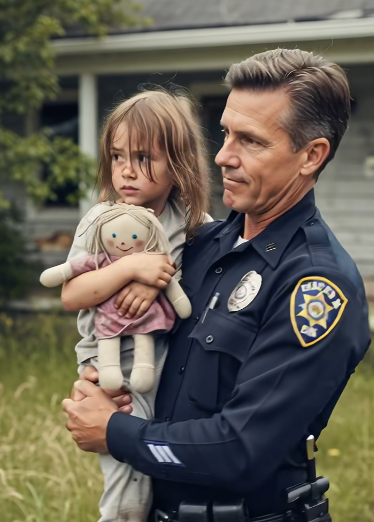The autumn wind carried a chill that seeped through Officer Thomas Shepard’s uniform as he patrolled the forgotten edges of Pinewood. At fifty-eight, with retirement just months away, Tom had seen it all—or so he thought. Thirty years on the force had hardened him, leaving behind a quiet man who moved through his days with mechanical precision, a bulwark against the emotional tides that had once threatened to drown him.
“Dispatch to Unit 14,” the radio crackled. “We’ve got a report of suspicious activity at 1623 Maple Lane. Probably just kids again.”
Tom sighed, the sound a small cloud in the cold air. “Unit 14 responding.”
The neighborhood had once been filled with families, the air thick with the smell of barbecue and the sound of children’s laughter. Economic hardship, however, had slowly emptied it, leaving abandoned houses standing like silent witnesses to better days. Tom pulled up to a weathered two-story home, its faded blue paint peeling away like old memories. Nothing seemed unusual at first glance. The yard was overgrown, windows dark—just another empty house waiting for life to return. But something made Tom pause as he swept his flashlight across the property. There, a flash of color against the brown, matted grass in the side yard.
His heart quickened as he approached what appeared to be a small bundle of clothes. But clothes don’t have tiny, dirt-caked fingers. Or tangled, matted hair. Or—his breath caught in his throat—shallow, desperate breaths.
“Dear God,” he whispered, immediately dropping to his knees beside the small figure. A little girl, no more than seven or eight, lay curled on her side, a fallen leaf in a forgotten world. Her clothes hung from her thin frame, and her skin was pale as moonlight. But what struck Tom most were her eyes—large, deep brown, and somehow still fiercely alert despite her condition. Those eyes locked onto his with an intensity that made his hands tremble as he reached for his radio.
“Unit 14, requesting immediate medical assistance! I have a child in critical condition at 1623 Maple Lane! I repeat, child in critical condition! Send an ambulance now!”
Tom gently touched her forehead, finding it burning with fever. “It’s going to be okay, sweetheart. Help is coming.” His voice, a tool he’d used to command and control for decades, broke with an emotion he hadn’t allowed himself to feel in years. He carefully adjusted her position, noticing the raw, chafed marks around her wrists and the alarming thinness of her arms.
The girl’s lips moved, but no sound came out. “Don’t try to talk. Save your strength.” Tom removed his jacket and wrapped it around her, fighting back a wave of grief and rage.
“Can you tell me your name, honey?” he asked softly, his voice a low rumble.
Her cracked lips parted again, but only a whisper of air escaped. As sirens wailed in the distance, a sound that usually meant the end of his involvement, Tom noticed something clutched in her tiny fist. It was a homemade bracelet, stitched from scraps of fabric, with a single, crudely embroidered word: Mea.
“Maya? Is that your name?” Tom asked, stroking her hair. “Maya?”
The girl’s eyes widened slightly, a flicker of something—recognition, perhaps—before they began to close.
“Stay with me,” Tom urged, his voice rising with a panic he hadn’t felt since he was a rookie. “The ambulance is almost here. Stay with me, please!”
As paramedics rushed toward them moments later, Tom couldn’t explain the overwhelming sense that this wasn’t just another call. This wasn’t just another child in trouble. In that moment, as he looked into those haunting eyes, he felt a profound and terrifying conviction: this moment would change everything.
The fluorescent lights of Pinewood Memorial Hospital cast harsh shadows across the waiting room as Tom sat hunched forward, his police cap clutched between weathered hands. Four hours had passed since they’d rushed the little girl through those emergency room doors, and still, no word.
“Officer Shepard?” A tired voice broke through his thoughts.
Tom looked up to see Dr. Elaine Winters, her silver-rimmed glasses perched on her nose, a clipboard in her hand.
“How is she?” Tom asked, rising to his feet, his joints cracking in protest.
Dr. Winters gestured to the chairs. “She’s stabilized, but her condition is serious. Severe malnutrition, dehydration, and a respiratory infection we’re treating aggressively.”
“Will she…?” Tom couldn’t finish the sentence.
“She’s responding to treatment,” Dr. Winters said, her professional expression softening with a hint of compassion. “She’s a fighter, that one. But I’m concerned about more than her physical condition.”
Tom nodded, understanding the unspoken message. “Has she said anything? Told you her name?”
“Nothing yet. We’ve registered her as Jane Doe for now.” The doctor hesitated. “Officer, there are signs that concern me. The marks on her wrists and ankles suggest long-term confinement. And her reaction to basic things—a television, even the hospital food tray—indicates she may have been isolated for an extended period.”
Tom’s jaw tightened. “I found something clutched in her hand. A bracelet with the name ‘Mea’ on it.”
“That might be her name, or someone important to her,” Dr. Winters noted. “We’ll try using it when she wakes up.”
“When can I see her?” Tom asked, an unfamiliar urgency in his voice.
“She’s sleeping now. Come back tomorrow morning.”
As Tom walked through the hospital parking lot, his phone rang. It was his captain.
“Shepard, what’s this I hear about you finding a kid?” Captain Reynolds’s voice was gruff. “Report came across my desk.”
“Little girl, severely neglected, found at an abandoned property on Maple Lane,” Tom replied, sliding into his patrol car.
“Social Services taking over?”
“They’ve been notified, but she’s in no condition for questioning.”
There was a pause on the line. “Listen, Tom, I know you’re heading out soon. Don’t get too invested in this one. Standard protocol. File your report, let the system handle it.”
Tom watched raindrops begin to splatter against his windshield. “She was holding a bracelet with the name ‘Mea’ on it. I’m going to check property records on that house tomorrow.”
A heavy sigh from Reynolds. “Just remember, you’re retiring in three months. Don’t make it complicated.”
But as Tom drove through the darkened streets, he knew it was already complicated. Something about those eyes. They reminded him of someone else, someone he had failed long ago, another child lost to a system that was supposed to protect her.
The next morning, Tom returned to the hospital with a small, plush teddy bear he’d picked up from the gift shop. When he entered the pediatric ward, a young nurse named Sarah met him with a warm smile.
“Officer Shepard, Dr. Winters said you might come by. Our Jane Doe is awake, but…” her smile faltered. “She’s not responding much to anyone.”
Sarah led him to a small room where the girl sat propped up in bed, her thin frame nearly lost among the blankets. Her eyes, those same deep brown eyes, darted to him instantly, wide and watchful.
“Hi there,” Tom said gently, approaching the bed slowly. “Remember me? I found you yesterday. I brought you something.” He placed the bear at the foot of the bed, careful not to move too quickly. The girl stared at him, unblinking.
“I was wondering if your name is ‘Mea,’” Tom tried. “Is that your name, sweetie?”
Something flickered in her eyes, not recognition of the name, but something else. Her gaze shifted to the bracelet now resting on the bedside table.
Tom followed her gaze. “Is ‘Mea’ someone you know? Or something important to you?”
The girl’s lips parted slightly, but no sound emerged. Sarah whispered from behind him, “That’s the most response we’ve gotten from her all morning.”
Tom sat in the chair beside the bed, instinct telling him not to push further. Instead, he began to talk quietly about simple things: the weather, the friendly squirrel he’d seen on the hospital grounds, the kind nurses. As he spoke, he noticed the girl’s shoulders gradually relaxing, her fingers loosening their death grip on the blanket. When he finally stood to leave, promising to return, the girl’s hand suddenly moved—a small, quick gesture toward the bracelet.
“I’ll help you find out what happened, little one,” he said softly. “I promise.”
Walking out of the hospital, Tom made a decision that defied his captain’s warning. This wouldn’t be just another case file. This child wasn’t just another statistic to be processed through the system. He would find answers, even if it meant delaying retirement, even if it meant reopening his own painful past.
The abandoned house on Maple Lane stood silent under the morning sun, its faded blue exterior a stark contrast to the crime scene tape that now framed the property. Tom ducked under the yellow barrier, badge glinting as he approached the front door.
“Morning, Shepard,” called a detective who’d been assigned to the case. “Thought you’d be enjoying your pre-retirement days on easy patrol.”
Tom shrugged. “Just following up. The girl’s condition is still critical.”
“Well, we’ve done the preliminary sweep. Looks like she might have been homeless, seeking shelter.”
Tom’s instincts told him otherwise. “Mind if I take another look around?”
The detective waved him on. “Be my guest.”
When the detective’s car disappeared, Tom stood in the doorway, taking in the house with fresh eyes. Dust covered most surfaces, but as he moved through the living room, subtle details caught his attention. A couch with a depression in one cushion, a shelf with spaces where items had recently sat, leaving dust-free rectangles.
“Someone was living here,” Tom muttered.
The kitchen told a more revealing story. A container of milk expired just one week ago. A box of children’s cereal, half-empty. These weren’t signs of abandonment from months or years past. He moved methodically through the house, documenting everything with his phone camera. Upstairs, the bathroom contained a child’s toothbrush. In what appeared to be the master bedroom, he found an unmade bed and women’s clothing in the closet. But it was the second bedroom that sent a chill down his spine. The door was locked from the outside with a heavy sliding bolt.
Tom stared at the lock, his heart pounding. After photographing it, he carefully slid the bolt open. The room was sparse: a small bed with thin blankets, a lamp, a few children’s books. What struck Tom was the contrast: while the rest of the house showed neglect, this room was meticulously maintained. The bed was made with hospital corners. The books were arranged by size. On the wall hung a child’s drawing: a stick figure of a girl holding a doll, with a sun shining above them. In crude lettering across the top, “Me and Mea.”
“Not her name,” Tom whispered, photographing the drawing. “Her doll.”
As he turned to leave, something caught his eye: a small piece of paper peeking out from beneath the bed. Kneeling, Tom retrieved what turned out to be a photograph, creased and worn from handling. It showed a woman with haunted eyes holding an infant. Tom flipped it over. Written in faded ink: Leanne and Amelia, May 2017.
“Amelia,” Tom repeated softly. Could this be her real name?
In the hallway, he noticed a calendar. The days were crossed off methodically until October 3rd, just three weeks ago. Next to that date, a single word: Medicine.
His phone rang, startling him. It was Sarah, the nurse. “Officer Shepard, I thought you should know. Our Jane Doe just spoke her first word.”
Tom’s grip tightened on the phone. “What did she say?”
“It wasn’t very clear, but it sounded like… ‘Mama.’”
Tom arrived at the hospital, clutching the photograph, his police instincts on full alert.
“She’s been asking for you,” Sarah said, leading him down the corridor. “Not by name, but she keeps looking at the door.”
“Has she said anything else?”
“Just that one word. The doctors say it’s normal for children who’ve experienced trauma to be selective about speaking.” She paused outside the room. “She doesn’t respond well to men in uniform, so…” Tom nodded, removing his badge and tucking it into his pocket.
The little girl—Amelia, if his hunch was correct—was sitting up in bed, arranging stuffed animals. When Tom entered, her eyes immediately locked onto his.
“Hello again,” Tom said softly. “I brought something I thought you might want to see.” He approached slowly and placed the photograph on the bed.
The girl’s reaction was immediate: a sharp intake of breath, her small hand reaching out to touch the woman’s face with trembling fingers.
“Is that your mom?” Tom asked. “Is her name Leanne?”
The girl’s eyes filled with tears, but she remained silent.
“And is your name… Amelia?”
At this, she looked up, the faintest nod confirming what Tom had suspected.
“Amelia,” Tom repeated, his voice warm with relief. “That’s a beautiful name.” A single tear rolled down her cheek as she clutched the photograph to her chest.
Tom sat in the chair beside her. “Amelia, I want to help you. Can you help me understand who ‘Mea’ is?”
At the mention of the name, her expression changed. A flash of longing, of desperate need. Her free hand moved to her wrist where the bracelet had been.
“Is Mea your doll?” Tom asked gently.
Another slight nod, more tears welling up. Tom leaned forward, his voice gentle but determined. “I’ll try to find Mea for you, Amelia. I promise.”
After leaving her room, Tom headed straight to the police station. The records department was his destination. “Property records for 1623 Maple Lane,” he told the clerk. “And anything we have on a woman named Leanne, who might have lived there with her daughter, Amelia.”
The results were startling. The property was purchased eight years ago by a Leanne Mills, paid for in cash. There was one domestic disturbance call from nine years ago, involving Leanne Mills and a man named Robert Garrett. She had declined to press charges. And then, something else: a missing person’s report, filed three years ago by a Martin Henderson, her social worker. The case had gone cold.
“I need everything you can get me on Martin Henderson,” Tom said. While the clerk searched, he reviewed the property records. Leanne Mills had paid $145,000 in cash for the house, a significant sum for someone with no visible employment history.
“Here’s Henderson,” the clerk said, handing Tom a slip of paper. “Retired two years ago, lives over in Westridge now.”
“One more thing,” Tom said. “Any record of a child registered to Leanne Mills? Birth certificate, school enrollment?”
The search came up empty. “Nothing in our system. If she had a daughter, there’s no official record.”
“That’s not possible,” Tom frowned.
The clerk lowered her voice. “Unless the birth was never registered. It happens more often than you’d think.”
As Tom walked to his car, pieces of the puzzle swirled in his mind. A house purchased with cash, a woman reported missing by her social worker, a child with no official records, and somewhere, a doll named Mea that meant everything to a little girl who had lost everything else.
Martin Henderson’s home was modest but meticulously maintained, much like the man himself. At seventy-two, the retired social worker retained the alert eyes and careful speech patterns of someone who had spent decades navigating bureaucratic minefields.
“I’ve been expecting someone to come asking questions eventually,” Henderson said, ushering Tom into a sunlit living room. “Though I thought it would be another social worker, not a police officer.”
“I’m here about Leanne Mills and her daughter, Amelia.”
Henderson’s expression remained neutral, but his hands tightened slightly around his teacup. “You found the child, then?”
“Three days ago, at the house on Maple Lane. And Leanne?”
“Missing, as far as we know.”
Henderson nodded slowly. “I feared as much. How is the girl?”
“Recovering physically. Emotionally…” Tom hesitated. “She’s spoken only a few words.”
“It’s a miracle you found her at all,” Henderson said. “I filed that missing person’s report three years ago, you know. Followed up monthly for the first year. No one seemed particularly concerned. Just another unstable woman who’d fallen through the cracks.” He explained how Leanne had been referred to his department after a domestic incident while she was pregnant, terrified her baby would be taken from her. She had been in an abusive relationship and had developed some unhealthy coping mechanisms, but she was determined to create a stable home for her child.
“But something went wrong,” Tom prompted.
Henderson sighed heavily. “The system failed her, Officer Shepard. It failed them both.” He described how budget cuts and a new director had led to Leanne’s case being downgraded, despite his concerns about her increasing paranoia and isolation. Then, one day, she was gone.
“The department records show that Amelia was taken into custody and placed in foster care,” Tom said.
Henderson’s eyes widened in genuine shock. “That never happened. Who told you that? It’s in the official record.”
“It’s a fabrication,” Henderson stood abruptly, moving to a small desk. After unlocking a drawer, he removed a worn manila folder. “I kept my own records. Unofficial, of course. Against department policy, but… I’ve been in social work for forty years, Officer. I know when documentation has been altered.” He handed the folder to Tom.
Tom opened it to find meticulously kept notes, copies of official reports, and photographs, including several of a younger Leanne with a toddler, Amelia. In one photo, the little girl clutched a handmade doll with button eyes. “Is this Mea?” Tom asked.
Henderson looked surprised. “The rag doll? Yes. Leanne made it for Amelia when she was born. Said it was a tradition in her family. Each child received a ‘guardian doll.’ Amelia was inseparable from it.”
“Mr. Henderson, who would have had the authority to alter official records about Amelia’s case?”
The retired social worker’s expression darkened. “Only two people. The department director, and the case supervisor who took over when I raised concerns… Robert Garrett.”
The name hit Tom like a physical blow. The same Robert Garrett from the domestic disturbance call.
Henderson’s eyes widened. “You didn’t know? Garrett joined the department six years ago. He was assigned as supervisor for my cases when I began asking too many questions about Leanne and Amelia.”
“I need to borrow these, Mr. Henderson,” Tom said, his mind racing.
“Of course,” Henderson gripped Tom’s arm with surprising strength. “But be careful. If records were deliberately falsified, someone has gone to great lengths to make these two people disappear.”
As Tom drove away, he couldn’t shake the chill that had settled in his chest. What had begun as a mystery about an abandoned child had transformed into something more sinister: a deliberate attempt to erase a mother and daughter from official existence.
The afternoon sky darkened as Tom pulled up to the house on Maple Lane, Henderson’s folder tucked securely under his arm. Inside, the house felt different now, layered with secrets he was only beginning to uncover. Tom moved purposefully through the rooms, searching with new knowledge. The photograph of Mea, the rag doll, had given him a clear target.
He returned to Amelia’s room, examining it with fresh eyes. Nothing. Frustrated, he sat on the edge of the bed, flipping through the photographs again. In most, Amelia clutched Mea to her chest, but in one, taken in the kitchen, the doll sat on a high shelf.
The kitchen looked exactly as he’d left it. His gaze traveled to the upper cabinets—too obvious. He scanned the room until his eyes landed on an old cast-iron stove in the corner. Unlike the rest of the kitchen, it appeared decorative. He approached it slowly, and when he tried the small iron door, it swung open easily, revealing a small, empty cavity. His disappointment was palpable, but something about the space seemed off. He reached inside, feeling along the back wall, his fingers detecting a slight seam. Pressing firmly, he felt a section give way, revealing a hidden compartment.
“Bingo,” he breathed, carefully extracting a bundle wrapped in faded fabric.
Unwrapping it on the kitchen table, Tom found not only Mea, the handmade rag doll with button eyes and yarn hair, but also a small, leather-bound journal. He gently set Mea aside and opened the journal to its first entry, dated just over three years ago.
They’re watching us again. I saw a car parked across the street for two hours today. When I went to check, it drove away. Robert has found us. I’m certain of it.
The entries continued, detailing Leanne’s growing fear and paranoia. In the final entries, dated just weeks earlier, her handwriting had become shaky, difficult to read.
The medicine isn’t working anymore. If something happens to me, whoever finds this, please tell my Amelia that everything I did was to protect her. Mea knows all our secrets. Mea will guide her home.
The last page contained only a name and address: Sarah Winters, 1429 Oakdale Drive. My sister. Amelia’s only family left.
Tom stared at the name, a jolt of recognition hitting him. Sarah Winters. Could it possibly be the same Sarah who worked as a nurse at the hospital? The Sarah who had been caring for Amelia?
Behind him, unnoticed in the storm’s shadows, a dark sedan pulled away from the curb, following at a careful distance.
The rain had subsided by the time Tom reached the hospital. He sat in the parking lot, Mea and the journal on the passenger seat, gathering his thoughts. If nurse Sarah was indeed Leanne’s sister, why would she remain silent? It made no sense, unless she, too, feared something—or someone.
Tom pulled out his phone and dialed Gloria from records. “Gloria, I need everything you can find on a Sarah Winters, currently working as a nurse at Pinewood Memorial. Also, what can you tell me about Robert Garrett’s current position with Social Services?”
Gloria’s fingers tapped audibly. “Garrett’s listed as Assistant Director of Child Protective Services, promoted last year. As for Sarah Winters… hmm, that’s interesting. She’s only lived in Pinewood for two years. Nursing license transferred from Oregon. It’s like she appeared out of nowhere.”
“Or changed her identity,” Tom murmured.
Tom tucked the journal into his jacket, keeping Mea visible as he entered the hospital. He found Amelia sitting up in bed, listlessly pushing food around on her dinner tray. When she saw him, her eyes brightened slightly. But when she spotted what he carried, everything changed. Her face transformed, eyes widening, a small gasp escaping her lips.
“I found her, Amelia,” Tom said softly, placing the rag doll in her arms. She clutched it to her chest with such intensity that tears sprang to his eyes.
“Mommy said Mea would keep me safe until someone good came,” she whispered.
“Your mom loved you very much, Amelia. Where is she?”
Her eyes filled with tears, but she nodded as if this confirmed something she already sensed. “She said she might have to go to Heaven, but Mea would stay with me.”
“Your mom wrote that Mea keeps secrets,” Tom said gently. “What did she mean?”
Amelia looked down at her doll, then carefully turned it over. With small fingers, she pulled at a loose seam in Mea’s back, revealing a tiny pocket. From inside, she withdrew a small, ornate key.
“Mommy’s special box,” she explained, holding it out to Tom. “Under the big bed, for the good person who would help me.”
Tom stared at the key, understanding washing over him. Leanne had prepared for the worst, leaving clues that only Amelia could reveal to someone who cared enough to find Mea. As Tom left the room, his phone rang. It was Gloria.
“Shepard, I found something. Sarah Winters’s original name was Sarah Mills. She changed it legally five years ago after a reported domestic incident. She’s Leanne Mills’s younger sister.”
As he reached his car, Tom noticed a folded piece of paper tucked under the windshield wiper. Meet me at Riverside Park. South entrance, 9:00 PM. Come alone. I need to explain about Amelia. – Sarah.
The park grew quieter as Sarah’s story unfolded, street lamps casting long shadows across their bench. Tom listened intently, the lockbox he’d retrieved from under the living room sofa bed heavy on his lap.
“Robert Garrett isn’t just some controlling ex-boyfriend,” Sarah explained, her voice barely above a whisper. “Amelia is heir to our grandmother’s trust fund. Nearly two million dollars when she turns eighteen. Money Robert can’t touch unless he has legal custody.”
“That’s why the falsified records,” Tom realized.
“Leanne contacted me once, about three years ago,” Sarah continued. “Said she had evidence of what Robert had done. The next day, my apartment was broken into. My computer stolen. That’s when I changed my name, moved here. I’ve been searching for Leanne ever since, working at every hospital in a hundred-mile radius, hoping she’d eventually seek medical help.”
Tom opened the lockbox, showing her the USB drive. “This might be the evidence she mentioned.”
Before she could respond, his phone rang. “Shepard,” Captain Reynolds said, “I’ve got a judge on the line. He’s willing to grant temporary emergency custody, but you need to get to the hospital now. Garrett’s people are already en route.”
The days at the cabin settled into a peaceful rhythm. Each morning brought subtle changes in Amelia. Her voice grew stronger, her smiles more frequent, her nightmares less intense. One rainy day, confined indoors, they decided to give Mea a bath.
“Wait,” Amelia said, her small fingers working at the loose seam in Mea’s back. “There’s something else inside.” With careful movements, she extracted a tightly folded piece of paper from the doll’s stuffing. “Mommy said the good person would know what to do with this, too.”
Tom unfolded the paper to reveal a handwritten list of names, dates, and case file numbers. At the top, in Leanne’s neat handwriting: Children like Amelia, removed from parents without cause.
“This is what Leanne was protecting,” Tom said quietly to Sarah. “Not just Amelia, but evidence.”
“Is it important?” Amelia asked. “Will it help other kids?”
Tom nodded, emotion tightening his throat. “Yes, Amelia. It’s very important. Your mom was trying to help a lot of children.”
A new understanding dawned in her expression. “That’s why she said Mea keeps the most special secrets. Because they could help people.”
Three months had passed since that fateful day on Maple Lane. Three months of healing, discovery, and justice. The investigation had exposed everything. Robert Garrett and three colleagues now faced criminal charges, while twenty-six children were in the process of being reunited with their families.
The courts had granted permanent guardianship of Amelia to Sarah, with Tom named as co-guardian. Their small cabin by the lake had become home.
As they walked Amelia to the waiting school bus for her first day, she suddenly turned, wrapping her arms around Tom’s waist. “Thank you for finding me,” she whispered.
Tom knelt, meeting her eyes—no longer haunted, but bright with hope. “No, Amelia. Thank you for finding me.”
She smiled, tucking Mea safely in her backpack before climbing onto the bus. As it pulled away, Tom and Sarah stood hand in hand, watching the beginning of a new chapter. Sometimes, the most precious treasures are found in the most unexpected places






